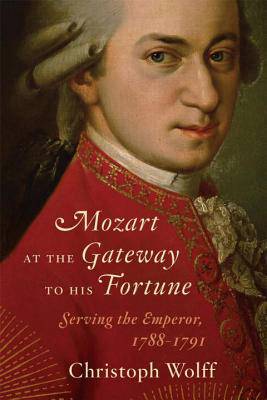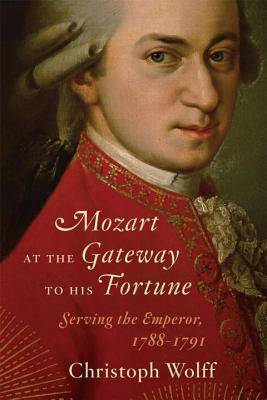
Door een staking bij bpost kan je online bestelling op dit moment iets langer onderweg zijn dan voorzien. Dringend iets nodig? Onze winkels ontvangen jou met open armen!
- Afhalen na 1 uur in een winkel met voorraad
- Gratis thuislevering in België vanaf € 30
- Ruim aanbod met 7 miljoen producten
Door een staking bij bpost kan je online bestelling op dit moment iets langer onderweg zijn dan voorzien. Dringend iets nodig? Onze winkels ontvangen jou met open armen!
- Afhalen na 1 uur in een winkel met voorraad
- Gratis thuislevering in België vanaf € 30
- Ruim aanbod met 7 miljoen producten
Zoeken
Mozart at the Gateway to His Fortune
Serving the Emperor, 1788-1791
Christoph Wolff
Hardcover | Engels
€ 38,95
+ 77 punten
Omschrijving
"I now stand at the gateway to my fortune," Mozart wrote in a letter of 1790. He had entered into the service of Emperor Joseph II of Austria two years earlier as Imperial-Royal Chamber Composer--a salaried appointment with a distinguished title and few obligations. His extraordinary subsequent output, beginning with the three final great symphonies from the summer of 1788, invites a reassessment of this entire period of his life. Readers will gain a new appreciation and understanding of the composer's works from that time without the usual emphasis on his imminent death. The author discusses the major biographical and musical implications of the royal appointment and explores Mozart's "imperial style" on the basis of his major compositions--keyboard, chamber, orchestral, operatic, and sacred--and focuses on the large, unfamiliar works he left incomplete. This new perspective points to an energetic, fresh beginning for the composer and a promising creative and financial future.
Specificaties
Betrokkenen
- Auteur(s):
- Uitgeverij:
Inhoud
- Aantal bladzijden:
- 272
- Taal:
- Engels
Eigenschappen
- Productcode (EAN):
- 9780393050707
- Verschijningsdatum:
- 21/05/2012
- Uitvoering:
- Hardcover
- Formaat:
- Genaaid
- Afmetingen:
- 142 mm x 211 mm
- Gewicht:
- 399 g

Alleen bij Standaard Boekhandel
+ 77 punten op je klantenkaart van Standaard Boekhandel
Beoordelingen
We publiceren alleen reviews die voldoen aan de voorwaarden voor reviews. Bekijk onze voorwaarden voor reviews.











